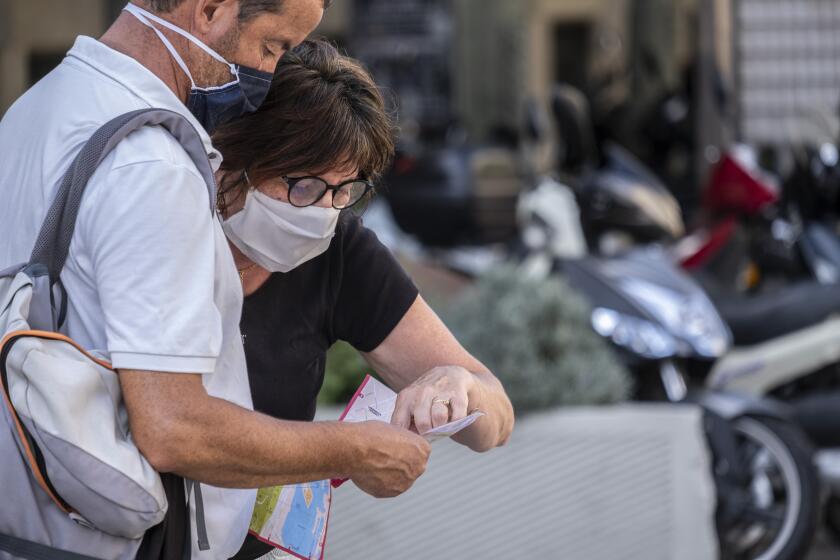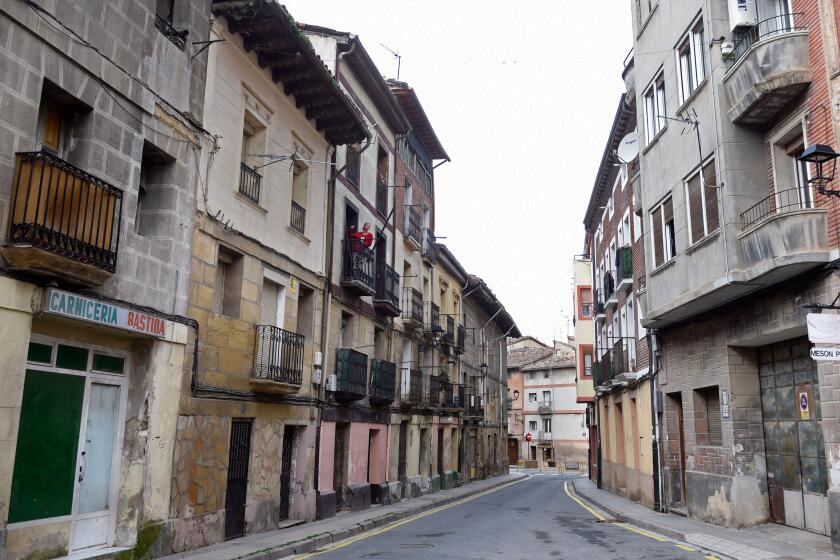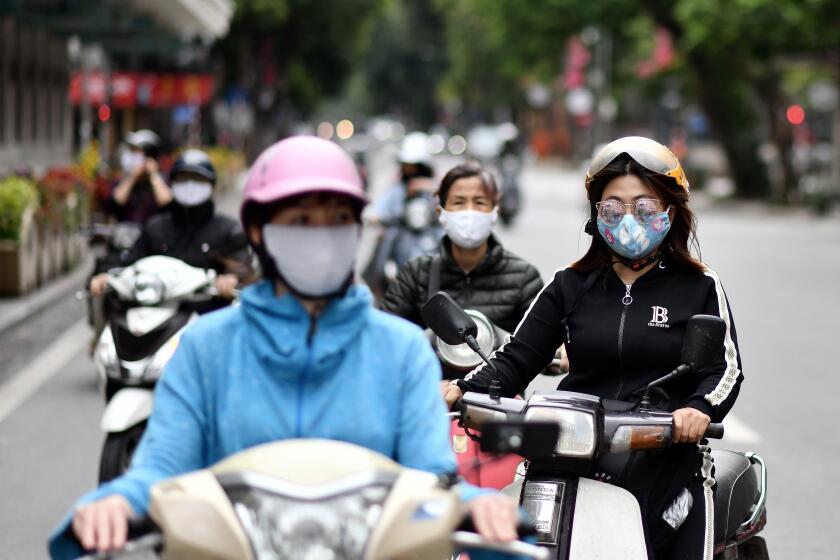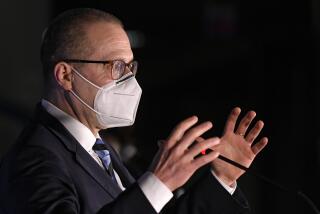Only weeks after restarting, European tourism runs into coronavirus trouble
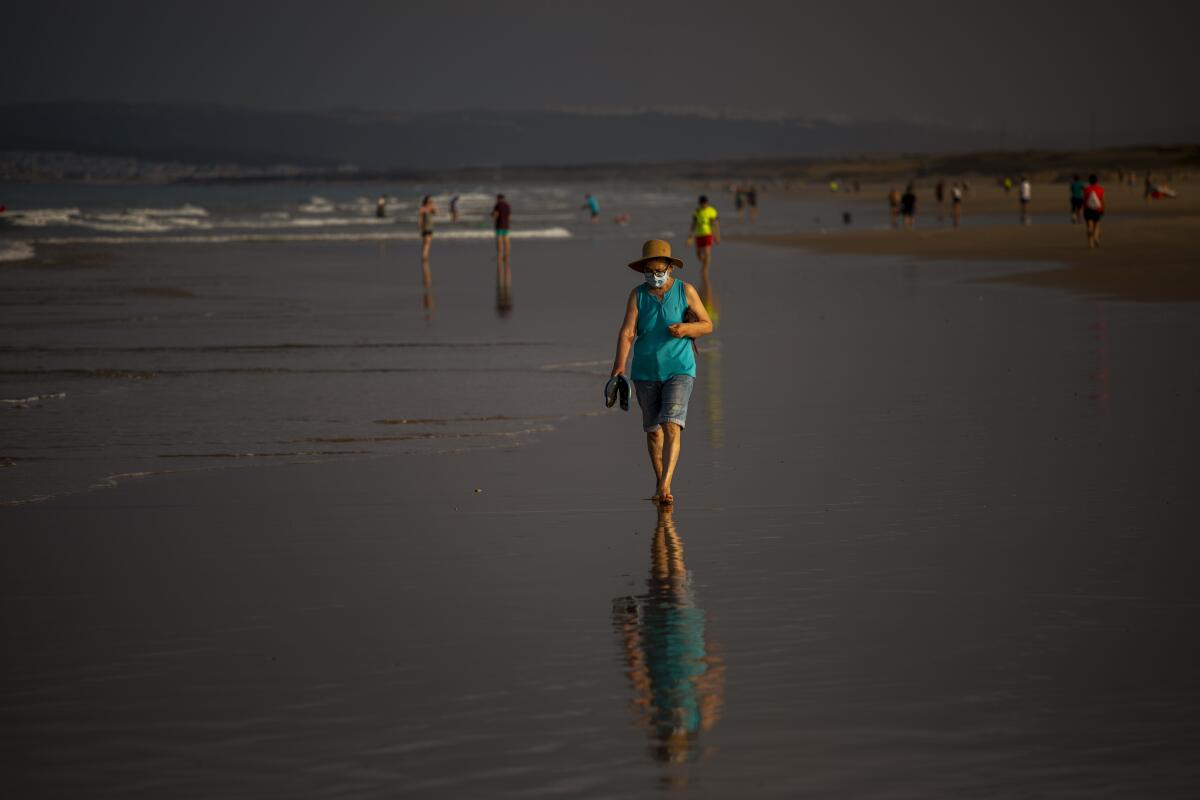
- Share via
BERLIN — Europe’s tourism revival is running into turbulence only weeks after countries eagerly reopened their borders, with rising infections in Spain and other countries sparking concern over people bringing the coronavirus home from their summer vacations.
European countries started opening up to each other’s tourists in mid-June — American visitors are still excluded — but recent events have shown that the new freedom to travel is subject to sudden setbacks. Over the weekend, Britain imposed a 14-day quarantine on travelers arriving from Spain, Norway ordered a 10-day quarantine for people returning from the entire Iberian peninsula and France urged its citizens not to visit Spain’s Catalonia region.
In Austria, the lakeside resort town of St. Wolfgang shortened bar opening hours after an outbreak was detected Friday. By Monday, 53 people had tested positive for the coronavirus, many of them interns working in the tourism industry.
In Germany, officials decided last week to set up testing stations at airports to encourage people arriving from a long list of countries deemed high-risk — including traditionally popular destinations such as Turkey — to get tested. They will also allow people to get tested elsewhere for free within three days of arrival.
“We are still very concerned about holidays,” the governor of Bavaria, Markus Soeder, said Monday. “My worry is not that there will be one big Ischgl, but that there will be many mini-Ischgls,” he added, referring to the Austrian ski resort that was an early European hot spot as the virus crisis took off in March.
“We are already seeing this in Spain, but also in other places,” Soeder said, adding that German residents’ trips to visit families abroad are also a concern. He called for tests at airports of vacationers returning from risky areas to be made obligatory, something that the federal government is considering.
Foreign visitors are vital to many European economies, which are clamoring — and competing — for tourists to return as coronavirus lockdowns ease.
“Mostly it is the considerate people who have behaved very cautiously on vacation anyway who take up the voluntary offers, while those who are more careless don’t take a voluntary test,” Chancellor Angela Merkel’s chief of staff, Helge Braun, told RBB Inforadio. New infections in Germany have been creeping higher from a low level.
Tourism employs 2.6 million people in Spain and generates 12% of the country’s economic activity.
Juan Molas, the head of a national association of Spanish tourism companies, Mesa del Turismo, said the country’s tourism sector has on average lost $5.8 billion a week since March.
Tourism Minister Reyes Maroto said the Spanish government is trying to persuade Britain to exempt the Balearic Islands, which have a relatively low infection rate, from the quarantine rule. “We’re living alongside the virus. That doesn’t mean we can’t travel. We can, if we are careful,” Maroto said.
How much of the summer season can be salvaged, and will efforts undermine the push to keep the pandemic under control? Countries may risk importing coronavirus cases from states with much higher levels of incidence.
The head of the Valencia regional government, which includes the popular Costa Blanca, also said he wanted an exemption. “The tourist season has already been very difficult,” Ximo Puig told Cadena Ser radio. “We had some hope of salvaging something in August, but this is a very hard blow.”
The northeastern Catalonia and Aragón regions have Spain’s most worrying coronavirus clusters, prompting authorities to tighten restrictions in Barcelona, in a rural area around Lleida and in Zaragoza that were relaxed only a month ago.
Catalonia is facing “the 10 most decisive days of this summer,” regional leader Quim Torra said, warning that it was in everyone’s hands to prevent a “critical situation” from worsening. But he also insisted that Catalonia was safe overall and said the tourism sector “is prepared with all the safety measures.”
Elsewhere in Europe, authorities in Belgium said that COVID-19 cases are growing at an alarming rate amid a surge of infections in Antwerp. Greek authorities said that they were likely to extend the mandatory use of masks at churches and shopping malls, citing worsening public adherence to safety guidelines.
In the town of Haro, famed for its Tempranillo, exaggerated or distorted news reports quickly shut down the local tourism trade.
And in North Africa, Morocco banned most travel to and from some major cities — including Tangier, Casablanca and Marrakesh, usually a popular tourist destination — to try to stem a small spike in cases.
In the Asia-Pacific region, many countries are still essentially banning foreign travelers or, if they do allow them to enter, requiring them to submit to tests and strict quarantine. That includes Australia, where the premier of Victoria state, Daniel Andrews, said the biggest driver in the region’s current outbreak is people continuing to go to work after showing symptoms.
Vietnam postponed next week’s hosting of Asia’s largest security forum and an annual meeting of Southeast Asian foreign ministers by a month to September because of the pandemic. Two Southeast Asian diplomats said Vietnam, which leads the Assn. of Southeast Asian Nations this year and appears to have controlled virus outbreaks within its borders, hopes to hold face-to-face meetings in mid-September.
Crossing borders was linked to other outbreaks in Asia. South Korea said 16 of the 25 new cases it confirmed Monday were tied to people arriving from abroad.
With fewer than 300 infections and no deaths, the communist-ruled nation offers an unusual model for containing the coronavirus.
The country in past days reported dozens of cases among crew members of a Russia-flagged cargo ship and hundreds of South Korean construction workers airlifted from Iraq.
A tally by Johns Hopkins University shows more than 16.2 million cases of COVID-19 worldwide and more than 648,000 deaths. The actual numbers are thought to be much higher because of limited testing and other issues.
The World Health Organization said the pandemic continues to accelerate, with a doubling of cases over the last six weeks.
The agency’s emergencies chief, Dr. Michael Ryan, stressed the need to “keep pressure on the virus.”
“Every single country where pressure has been lifted on the virus, where virus is still at community level, there’s been a jump back in cases,” he said.
More to Read
Sign up for Essential California
The most important California stories and recommendations in your inbox every morning.
You may occasionally receive promotional content from the Los Angeles Times.

